Reparations Advocacy within the UK and EU Parliament
July 7, 2025
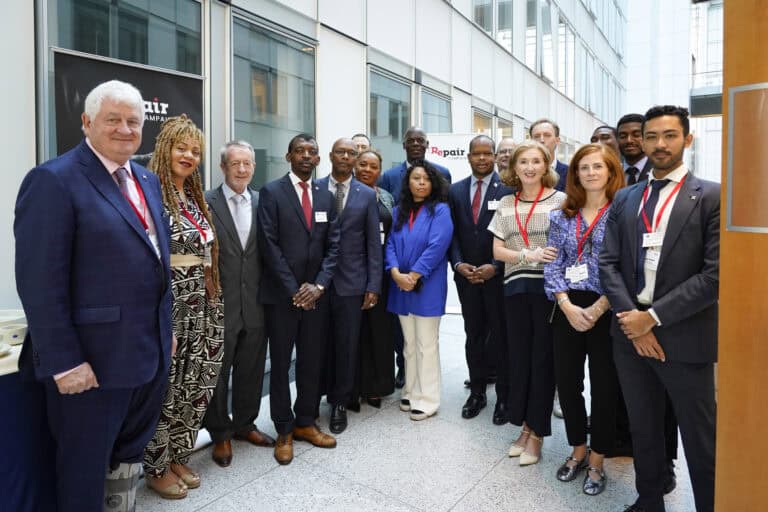
During the first week of July 2025, The Repair Campaign accompanied several prominent Caribbean public intellectuals and reparation advocates to speak with various members of parliament in the UK and EU about why reparations matter and identify allies within parliament who would support this as an important issue on the political agenda.
Their reflections on reparatory justice offer a powerful and urgent call to address historical injustices with meaningful action. By framing justice as both material and symbolic, their reflections challenge regional governments to move beyond rhetoric and commit to transformative change. True reconciliation requires courage, political will, and an unwavering commitment to equity – an imperative the Caribbean and Europe can no longer afford to ignore.
Below, we share some thoughts and reflections from the Caribbean delegates about the meetings in Brussels and London.
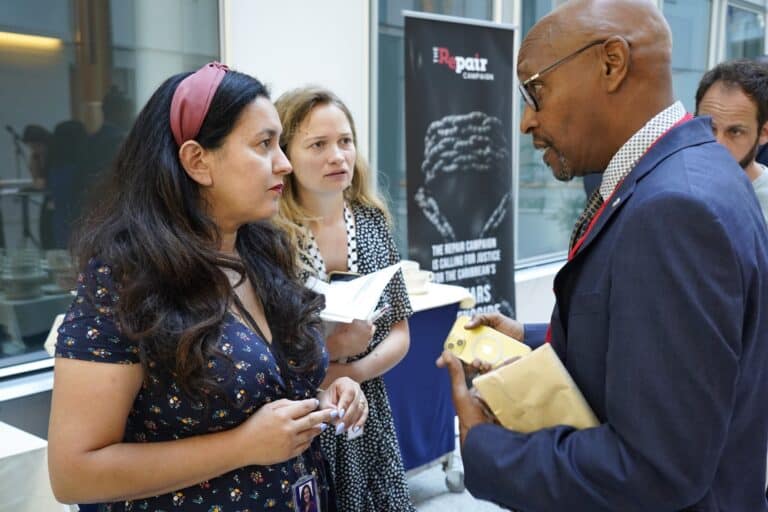
Professor Jean-Marie Théodat:
“This is not a fight of one community against another, it is a fight of one set of morals agaisnt another. Our delegation to Europe was extremely representative of Caribbean nations, receiving promising engagement with Members of Parliament (EU) and placing reparations as a key part of EU future engagements with the region. “Such a decision [about reparations] needs to be made by public consensus”, Jean-Marie Theodat continued, emphasising the critical need to engage public audiences with the significance of reparatory justice.”
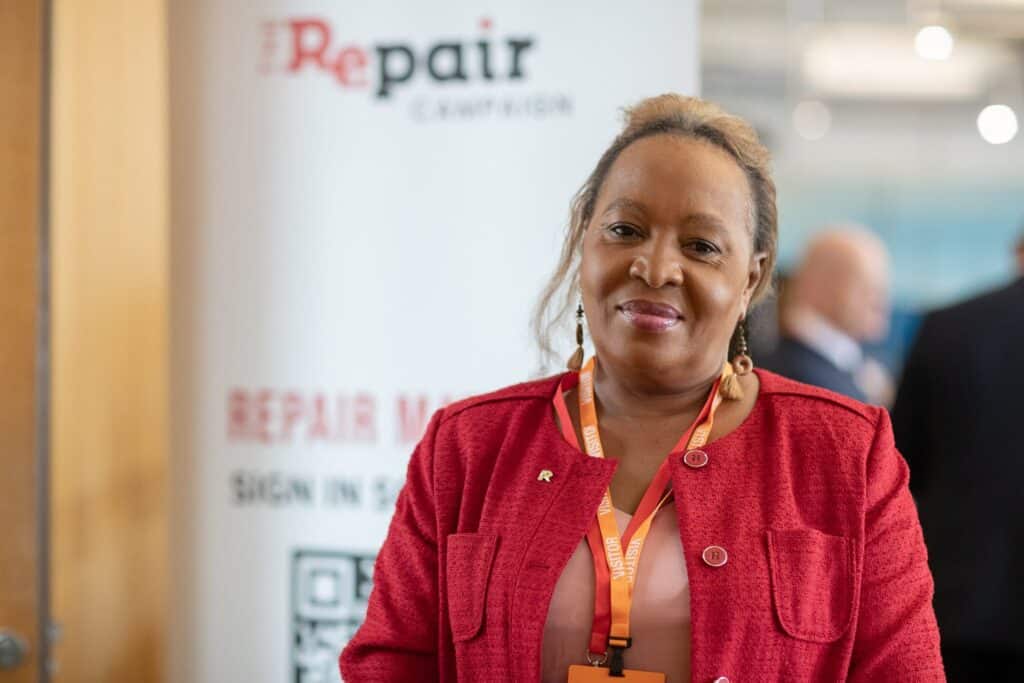
Professor Cynthia Barrow-Giles:
“This was a critical catalyst to globally jump-start the CARICOM Reparations Agenda.
The June 30 to July 2, 2025 Caribbean delegation to Brussels and London took the form of a preliminary targeted campaign aimed at mobilising support for reparatory (socio-economic) justice in the Caribbean. The delegation primarily focused on sensitisation, raising awareness and building political consensus on the merit and necessity of reparatory justice. However, given that ultimately governments must support the cause to achieve The Campaign’s political objective, a broader effort aimed at laying the groundwork for a legislative and community mobilisation designed to redress the historical harm that has had a profound impact on the Caribbean communities must be undertaken. The delegation was cautiously optimistic about the impact of its initial foray, largely because of the awareness of the political sensitivities surrounding historical compensation in the context of socio-economic and other global uncertainties.
Importantly, I viewed the trip to Brussels and London as exploratory, as delegates engaged in preliminary conversations designed to gauge the level of interest in, understanding of the cause, and the possibility of identifying and solidifying potential allies as the strategic way forward. That strategy clearly outlined by Mr. Denis O’Brien and professor Don Marshall, is the starting point of the short to medium term objective of building a coalition of willing partners, starting with those who were open to dialogue and receptive to the idea of taking concrete steps toward justice for the centuries of harm and colonial exploitation. This achieved a measure of success as evidenced by the passionate support for the cause.
Based on some of the conversations I had with primarily younger persons, it is obvious that there is a need to present to this demographic group, critical evidence of both the historical grievances and the post-independence and contemporary consequences of enslavement and indentureship on the political economies of the region. Some of the younger persons were unfamiliar with the long-term structural disadvantages still faced by many Indigenous and black communities. To that extent, the conversations were fruitful, enabling the delegation to broaden understanding and encourage support for the movement/cause.
Secondly, while there is a recognition of the moral imperative to engage with reparatory justice for the region, there is a pressing need to undertake the following:
- Memory Politics: Prepare and execute national campaigns to sensitise the targeted populations to the realities and nuances of descendants of slavery, indentured servants and indigenous populations.
- Coalition of Voices: Beyond the visit, momentum can be sustained by expanding the coalition of voices—particularly indigenous communities, youth, and others—who can share their experiences directly with policymakers and the public.
- Political Caucus: Organise a caucus of parliamentarians and other interested persons to push the agenda of reparatory justice.
- Social media: Using social media more effectively via short 30-second videos to further the conversations through storytelling, for instance, to mobilise support both within the Caribbean and beyond.
- A plan of action is required, which must clearly enunciate the priorities of The Repair Campaign within the context of the CARICOM ten-point plan.”
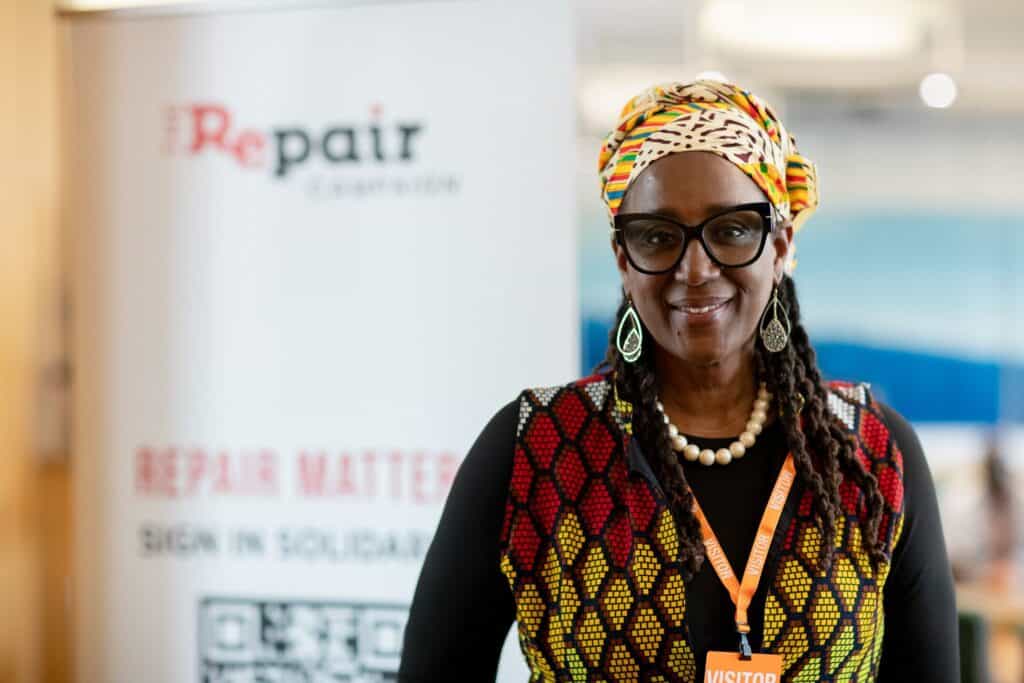
Carla Astaphan, MA Reparatory Justice student at the University of Glasgow, and Chair of the St Kitts and Nevis National Reparations Committee, shared that this was a necessary and generative conversation bridging both sides of the Atlantic. Carla Astaphan highlighted the conversations and connections made across political and community spheres in the EU and UK, further emphasising key steps in building a collective front within movements for reparatory justice.
“It was a good set of meetings. It worked to build a connection with those we met, as it was an informal setting which allowed people to converse and get to know each other better.
There needs to be a synchronisation of efforts towards reparations. I think now we need to build more with the MPs, so we really know how we’re going to approach this. There’s a lot of work to be done but this was a great step.
It’s all about getting both state and non-state actors to see the responsibility to reparations, whether from a moral or legal standpoint. Because there were injustices meted out to indigenous people and African people who continue to go through the traumas and injustices, whether economically or personally. There’s a need for healing on both sides.”
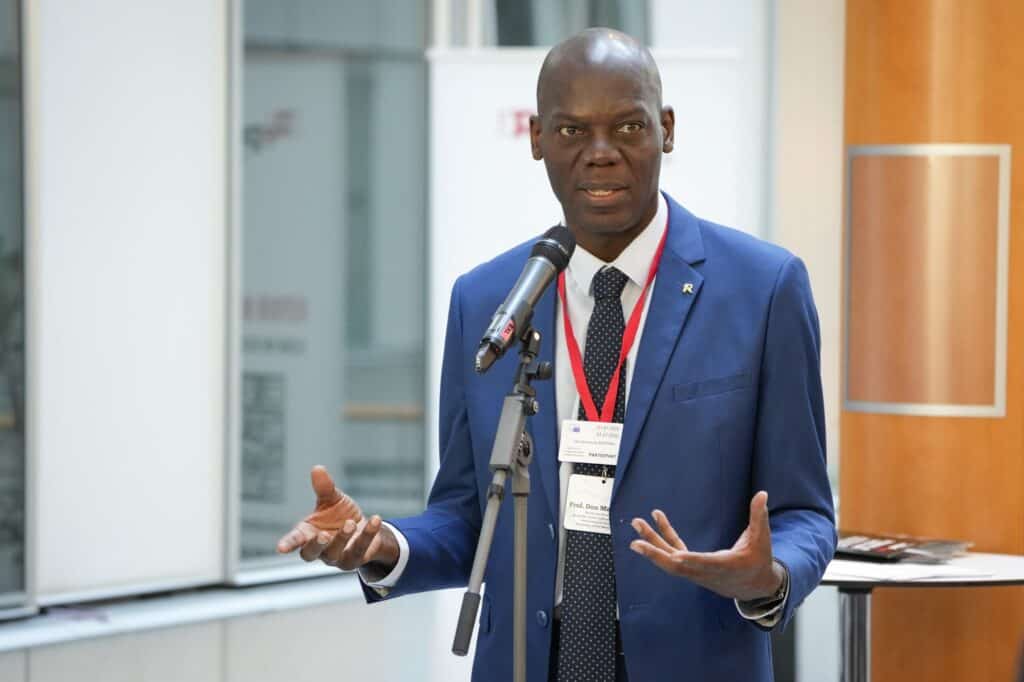
Professor Don Marshall shared compelling and powerful discourse grounding the histories of injustice from the Caribbean today:
“One of the major injustices of our time…is how invisible the question of reparations is today…because if you ask the question what it means to be human, it opens up a kind of question of how different peoples in parts of the world were treated as disposable, as though some people in parts of the world were treated as though they had no history. There are a number of peoples in the Caribbean who suffered that kind of erasure. A sediment of historical wrongs have settled to create lasting traumas.
And for African people, we have yet to have a post-plantation moment. So it is about dealing with the sedimented wrongs that have affected the region. It is a day of reckoning, and it has to come…when we’re supposed to be building towards peace and stability…imperial relations have taken over international relations. Because we have to settle, in the 21st century, this question of what it means to be human… there are many competing perspectives of how we do reparations… for all our friends building solidarities of support, we are continuing to sojourn this discussion.”
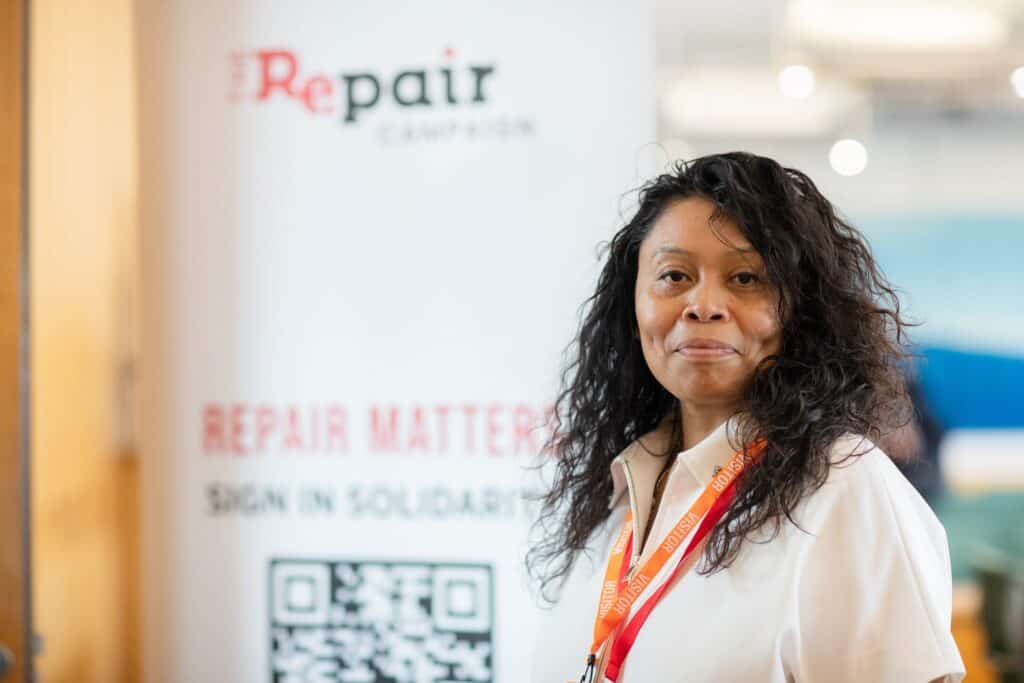
Uriël Sabajo:
“I’m glad that The Repair Campaign is here, and that we are here as a team. This journey of only 3 days was not only to talk with members of the parliament in Brussels and London, but it went deeper. We as the team really connected. And by doing the work from a positive intention and from the heart we made a real impact and will continue to make a real impact. We feel the connection between us, and that real connection – that is real reparations, from the heart, from the soul, from the spirit.”
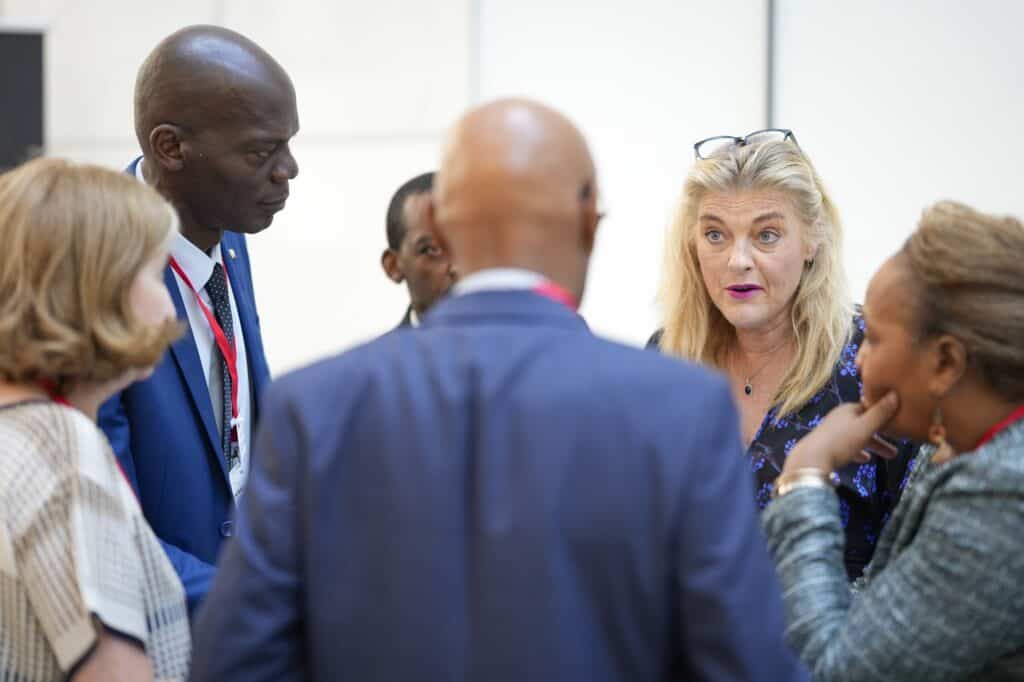
In meeting with Members of European Parliament (MEPs) and Members of UK Parliament (MPs), we received encouraging engagement with officials who understood and were keen to support the calls for reparatory justice on a global political stage. For instance, Cynthia Ní Mhurchú, Irish Fianna Fáil MEP, shared that “in history we cannot just ignore and trample over democratic rights of people in their own native lands.”
Baroness Margaret Curran, from the UK House of Lords, emphasised the need to “work in partnership based on truth and transparency and writing some of the great historical wrongs that too many people have suffered.”
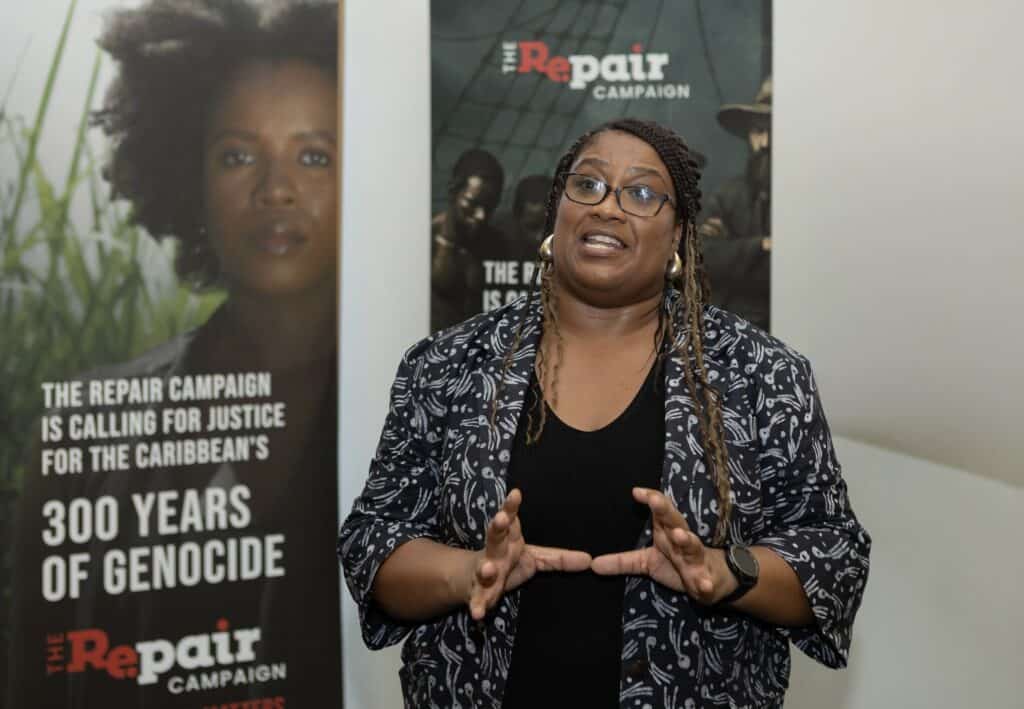
Labour MP Bell Ribeiro-Addy and Chair of the All-Party Parliamentarian Group for Afrikan Reparations, centred why repair matters today everywhere, emphasising that “we have to understand that this very building in which we stand, and this whole entire city around us, this country, the fact that our [UK] very small island nation has the standing that it has across the world, it’s due directly to enslavement and colonialism.” MP Addy gave the crucial reminder of what reparations are about:
“We need to repair the inequalities across the different societies and countries. And that starts with actually looking at what enslavement and colonialism has brought about in various countries… we need to make sure that we have that equality, that we’re looking at environmental reparations, educational reparations, that we’re looking at making sure that all of the countries that we deliberately disadvantage to increase the standing of our own have access to the same financial products and the same access to the UN, the same access to all of these different international bodies that we have… That is repair. That is equality.”
